Howard Keel Centennial: "Annie Get Your Gun"
 Wednesday, April 10, 2019 at 9:00PM
Wednesday, April 10, 2019 at 9:00PM Our Howard Keel Centennial celebration begins. Here's Nathaniel R...
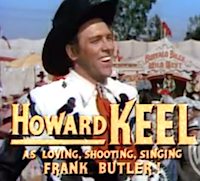 What is the lasting legacy of Hollywood's biggest musical of 1950, Annie Get Your Gun? The best remembered thing about it may well be its place in Judy Garland's storied career; she was infamously fired well into production, marking in some ways the nadir of her career, and fueling the mythology of that comeback of all comebacks with A Star is Born (1954) after a four year absence from the big screen. But that's not the movie as it exists today, only what could have been. And "could have beens" are many with this troubled production which lost its original star (Judy), its first two directors (Busby Berkeley and Charles Walters) and one key supporting cast member (Frank Morgan as Buffalo Bill, who died after filming began) on its way to its final cut.
What is the lasting legacy of Hollywood's biggest musical of 1950, Annie Get Your Gun? The best remembered thing about it may well be its place in Judy Garland's storied career; she was infamously fired well into production, marking in some ways the nadir of her career, and fueling the mythology of that comeback of all comebacks with A Star is Born (1954) after a four year absence from the big screen. But that's not the movie as it exists today, only what could have been. And "could have beens" are many with this troubled production which lost its original star (Judy), its first two directors (Busby Berkeley and Charles Walters) and one key supporting cast member (Frank Morgan as Buffalo Bill, who died after filming began) on its way to its final cut.
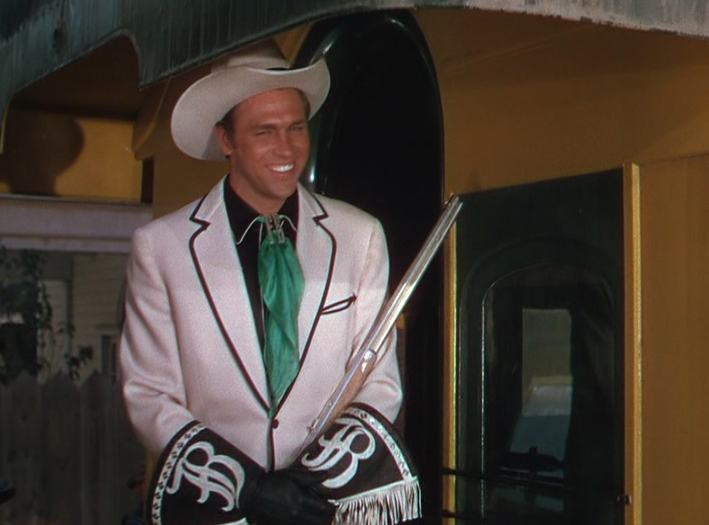 The first shot of Howard Keel in "Annie Get Your Gun"
The first shot of Howard Keel in "Annie Get Your Gun"
Though "Annie Get Your Gun" has had a long healthy life on stages, big and small (including three Broadway runs: 1946-1949, 1966, and 1999-2001) it's most lasting cinematic contribution is the introduction of Howard Keel as a leading man...
He was immediately a star after his Hollywood debut in Annie Get Your Gun but always second billed to the female star within this particular genre (with the exception of Kismet in 1955). His most direct comparison within the 1950s star system would surely be Gordon MacRae over at Warner Bros (Carousel, Oklahoma!, Tea For Two) though MacRae more often had top-billing. But a confession which you've probably guessed: Mostly, we're celebrating Howard Keel's centennial this week because we'll take any old excuses to watch musicals!
Keel had made a splash on Broadway in the late 1940s in Rodgers and Hammerstein musicals so he entered the movie industry buzzing and got a star's entrance on screen in Annie Get Your Gun's opening number. You're directed to watch him enter the frame, mid-song, and ladies in western finery swarm around to gawk at him.
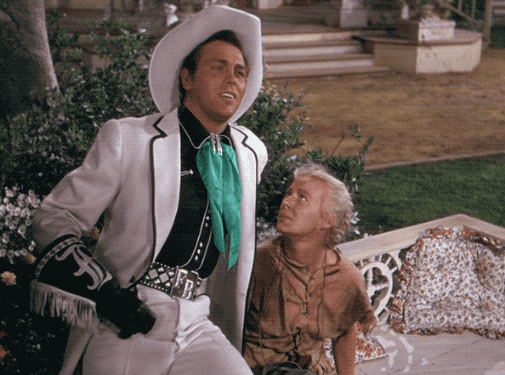
Ladies lusting after Keel will be a recurring gag throughout the movie, mostly as an offscreen plot point but onscreen by way of mugging Betty Hutton in the leading role, her jaw dropping multiple times when she's surprised to be looking.
He sure is purty."
This kind of relentless gawking at Keel, who was an attractive man but not a gobsmacking head-turner like a Kelly or a Brando, can strain credulity a bit. On the other hand his attractiveness, like his singing voice, is a worthy 1950s time capsule; he was definitely of the era, if not defining it. Barrel-chested, larger men (He was 6'3") with deep bass voices were definitely out of fashion within a decade or so's time in musicals (doesn't it seem like every leading male role is for tenors now?) and they even took a hit in non-musicals, too.
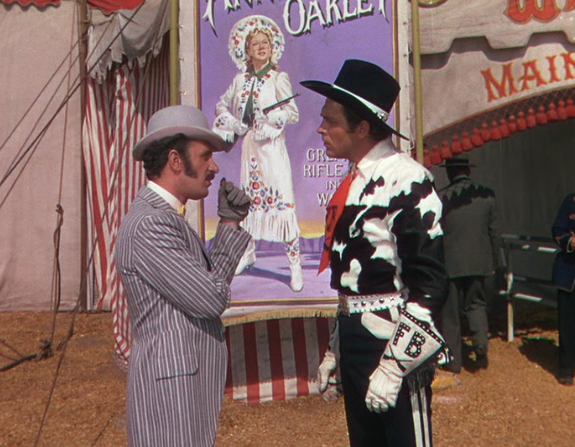 Frank is pissed that Annie gets a huge poster outside the tent
Frank is pissed that Annie gets a huge poster outside the tent
In the movie Frank Butler (Keel) and Annie Oakley (Betty Hutton) are at odds over who the better sharpshooter is. Butler has made his whole career at being a great marksman but Annie and the audience knows what's what: It's Annie who is the best in the world. But she's a country girl new to Showbiz. She vacillates between totally worshipping Butler and calling him a "swollen-headed stiff" and the plot is a kind of non-tragic Star is Born; her star rises and she feels overwhelmed by stardom, they fall madly in love, but his star does not fall nor does he drink too much. Frank merely gets his ego-bruised a bit before their mutual Happily Ever After.
Speaking of ego-bruising, one of the movie's (and Hutton's) best bits is when Oakley mocks Butler's posture, mannerisms, and emphatic singing style in her reprise of "The Girl I Will Marry".
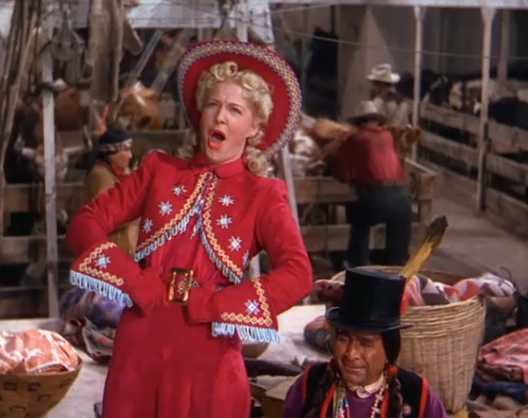
He sang me a love song. He just spit his heart right out at me.
If you know Howard Keel's career, this is pretty spot on (he wasn't exactly a character actor so Frank Butler is Howard Keel) Nevertheless, for essentially his first big onscreen role (he had made one picture in London before this) Keel acquits himself well, physically at ease in front of the camera and light on his feet with the comedy even if the acting never scratches below the surface, let alone digs. But that's okay given the BROAD material and that he's essentially the love-interest rather than the true star. Betty Hutton, oddly, struggles more. Hutton was a fine comic actress (see The Miracle of Morgan's Creek for proof) and she was Golden Globe nominated for this huge hit (in the top five grossers of its year) but let's just say the performance hasn't aged well. Either she wasn't directed at all by the third man in the director's chair, George Sidney, or the nerves got to her -- would you want to replace Judy Garland? (I mean...)
The problem essentially is that she vacillitates between Merman-esque playing to the very last row in a cavernous theater (which is, ahem, a lot when cameras are involved) and subtler more traditional movie star acting. She's trying out everything all throughout the picture as if she hasn't quite decided which tactic is going to work to sell this BUT SHE WILL SELL THIS. Hutton has moments of inspiration earning big laughs with some of her physical comedy but it's just turned up to eleven even when it needs to be at a three in some quieter scenes. Keel has it easier. He disappears for a good long stretch and, freed of the need to carry the picture, glides back into it so smoothly in a tux that you're thrilled to see him again.
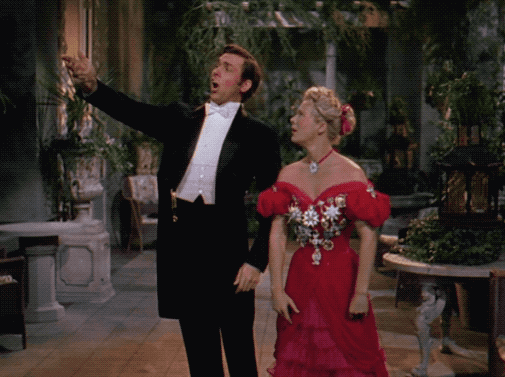
He returns just in time for the film's best number "Anything You Can Do (I Can Do Better)." Hutton and Keel famously did not get along on the picture, both accusing the other of trying to steal it. No wonder they both excel at the classic musical comedy duet that requires that their characters do just that.
Next: Calamity Jane (1953)



Reader Comments (13)
I find this hard to sit through, mainly because of Hutton's unfortunate performance. In my memory it's like Agnes Moorehead's character in "Hush Hush Sweet Charlotte" is the lead in a musical, often filmed with a head-on fisheye lens like it's an episode of "Good Eats".
Nevertheless, welcome, Keel series!
Keel was not really a great actor. But that voice! I read his autobiography a few years ago. And while it's full of mildly salacious material, he basically says that music saved his life because, from what I read, he had a pretty miserable childhood. And that made me kinda love him. Regardless, he'll always be Clayton Farlow from Dallas to me!
For all it’s faults, I view and appreciate AGYGun more Because of Betty Hutton. MGM was in a bind after Garland dropped out of this big-ticket project. Even though Hutton was loaned out from Paramount, Nobody in the MGM musical stable could possibly and immediately fill the boots of Annie Oakley. Who was there-June Allyson, no way-Cyd Charisse, no-Ann Miller—-she had the brashness, but not the tomboyish/outdoors quality needed-Lucille Ball, no pipes, Ginger Rogers (post Barkleys), not rough-n-ready enough, Esther Williams? Even if MGM had to go to other studios, would this film be the same with Betty Grable or a very-pre Calamity Jane (cough, AGYG rip-off) Doris Day. Would the big screen want to see Ethel Merman?!?
So, maybe fault the Director, but in my opinion, Hutton rescued this film.
Interesting note: Both Buffalo Bill and Frank Butler were considerably less sexist in real life than as portrayed in this turkey.
We need to talk more about the men of the 1950s! In all fairness we revere and reverence until a comet collides with the earth and turns everything into cosmic dust the unbelievable and unforgettable women of this decade (Marilyns, Graces, Audreys, etc.). But what about the men? William Holden, Marlon Brando, Howard Keel, Rock Hudson, Montgomery Clift, Edmund Purdom (underrated), Mario Lanza, Howard Keel, James Dean, Paul Newman, John Gavin, Steve Cochran, Harry Belafonte, Stephen Boyd, Tony Curtis, Peter Palmer, Yul Brynner, Howard Keel, Richard Widmark, James Darren, Robert Wagner, Tab Hunter, Richard Egan, Jeffrey Hunter, Dirk Bogarde, John Derek ...
He dated Ava Gardner!
I'm not generally a fan of Betty Hutton's rambunctious camera-hogging. But over the years I've become quite fond of her work in "Annie Get Your Gun". Her energy level's high in it, but not alarmingly so. And - when needed - she conveys genuine sweetness. Also, of course, she fully makes the songs her own. Of course, like many, I used to mourn the loss of what it all could have been in Judy's hands. But - based on the extensive unused Garland material that's available - it's clear that at this particular time she had neither the health, energy or will to make the thing work. Also, for all her gifts, Judy never had a knack for playing yokels and that's another aspect of the part Hutton nails. After Judy's exit, there were some other serious contenders. According to Dolores Gray ( toast of the town in the London production of "Annie Get Your Gun"), MGM offered her the part, but her stage producers refused to give her time off. And wonderful Betty Garrett, then under contract to Metro, came close to nabbing it. Judy Canova and Dale Evans also eyed the role longingly. And all might have made excellent Annies. But of course none had Hutton's box-office clout. By the end of the 40's she was probably Paramount's biggest female star. In the end, I'm glad she got to do it. I think now it's pretty much regarded as her signature role. As for Mr. Keel, as Frank Butler, well he's perfectly perfect.
Betty Hutton doesn't need 3-d. She is 3-d!
***
Our man Howard Keel easily steals the show from the protagonist who, with her style, let's say "exaggerated" - that works perfectly in some movies - sounds here out of place. Judy Garland, each film, more and more mature as an actress, would take the film and the character to another dimension. She was able to make routine movies that could have been forgotten today as The Harvey Girls (1946) and In The Good Old Summertime (1949) into movies not to be missed because of her magic. Judy's loss, our loss.
MGM is truly the "House of Musicals". Even the second and third line musicals of the studio seen today are better than some class a ones of other studios and one of the secrets is that they took care of the quality of the scripts. One of the main features of MGM is the richness of details of the costumes and art direction, from the 1930s with black-and-white films to its heyday in the 1950s with the most beautiful technicolor. Not only in the musicals, epic movies (Gone With The Wind, 1939), horror movies (The Portrait of Dorian Gray, 1945, Dr. Jeckyll and Mr Hyde, 1941), comedies (Father of The Bride, 1950), classic books adaptations (Little Women, 1949). The luxury of the movies of the company is not a result of effort but a style, a way to do. Even b movies that they produced as, for example, The Asphalt Jungle (1950) [b in budget not in talent] have the brand of good taste and sophistication of the most powerful film company that ever existed. ANNIE GET YOUR GUN would be no different. And it's also dazzlingly beautiful. Howard Keel, the main theme of this series, was lucky and unlucky. Lucky to start in the studio with a big hit and unlucky for not being able to be the leading man of its biggest star.
I can't say I love this film, though most of the songs are timeless, but its a big gaudy entertainment for sure.
Keel does well for a virgin effort and his voice is in great condition.
Betty Hutton does go big but then that was very much her persona and what the audience expected and only a very strong director was able to, if not contain at least curb that enthusiasm to the proper level. In her autobiography she talked about how excited she was when she was loaned to MGM for the film after Judy was fired but that the filming was a torture because of the hostility she was greeted with by the cast and crew who seemed to resent that she had assumed the role. As if that was her choice! Anyway they made life hell for her during the filming and she said that George Sidney basically told her "Do what you do and get away from me" . I'm not saying she was totally without blame, from what's been written about her she was a complex, high-strung difficult woman but others have commented that she was shut out and made to feel unwelcome during the filming.
I'm glad you mentioned Gordon MacRae. That's a good comparison. While I like Keel I LOVE Gordon MacRae. Neither was a great actor, both had beautiful voices but MacRae didn't exude the sense of ego nor vanity than Keel did making him much more likable in his roles.
I always confuse Betty Hutton with Jane Powell. I agree that this would have been a tough recasting decision, balancing name recognition with ability.
I love old musicals, but the aggrieved unsettled feeling I have at the end of them sometimes has to do with the problems I have with the book (ie stupid stories).
I’ve never seen the Barbara Stanwyck movie where she plays Annie Oakley, but she would be perfect as Annie. I liked Geraldine Chaplin’s take on the character in Altman’s “Buffalo Bill”, slight but wiry and tough.
I had a book that I loved as a kid about Annie Oakley, so I had a mental picture of her before I saw this musical. And I just keep getting pissed off about how condescending it is about her. Poor little backwoods hick, dirty and grubby with no sex appeal. Really?
No wonder Betty Hutton’s performance is all over the map. She’s selling it with her own competence, while the book undercuts the character.
Follow-up to casting choices-forgot about Betty Garrett. She would’ve been fresh off On The Town and has a striking resemblance to the original Annie Oakley, Barbara Stanwyck. Not sure if she was considered ‘A’ list by worried MGM producers, or if the brass was ready to gamble & elevate her with his major project. In the end, Betty Hutton prevailed.
Howard Keel was probably the studliest of the MGM musical stars